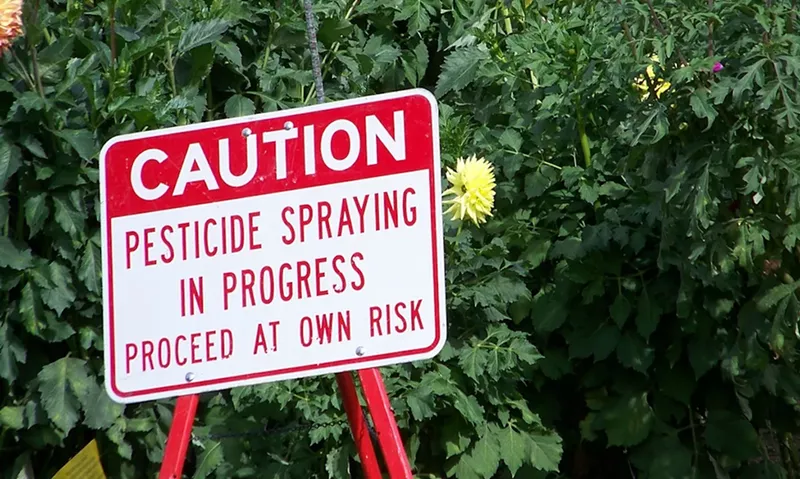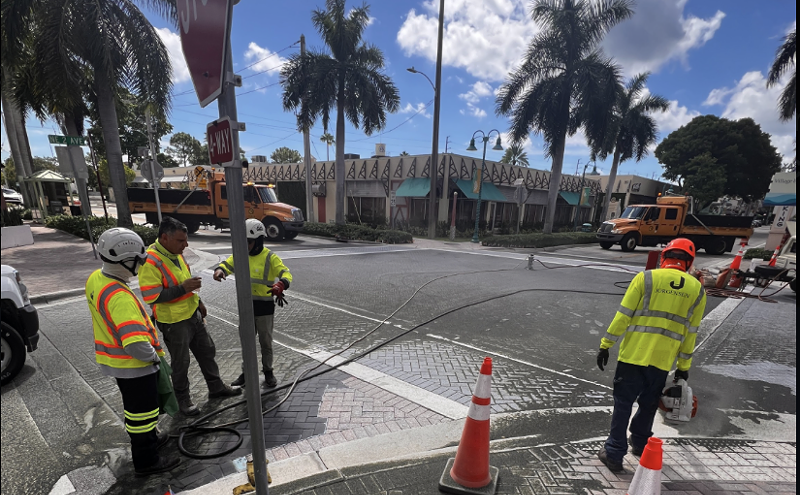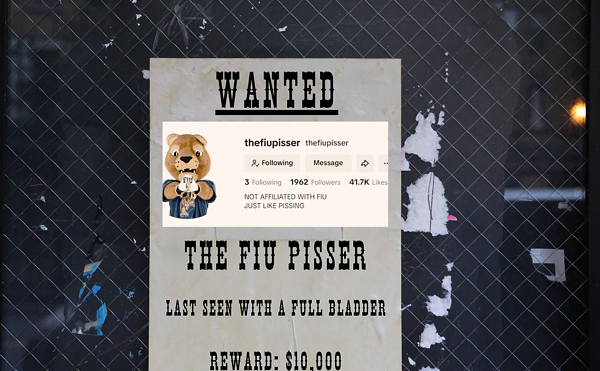Every year toward the beginning of rainy season, dense clouds of black salt marsh mosquitoes begin rising from the Everglades and coastal wetlands and descending upon Miami. For years, Miami and the Keys have fought back with a powerful tool: permethrin, a pesticide effective at killing the insects before they can make life miserable for South Florida.
But a new study suggests that chemicals like permethrin are also dangerous to humans. The peer-reviewed research looked at a small area in New York subjected to regular aerial spraying and found an association between the pesticide use and the development of autism in children who live nearby.
"This isn't a random poke in the dark. They already had good reason to suspect a connection between these pesticides and childhood developmental delays," says Philip Stoddard, South Miami's mayor and a professor of biological sciences at Florida International University. "Lo and behold, they found an association."
The new research, published in Frontiers in Pediatrics, comes in a study headed by Steven D. Hicks, a medical researcher at Penn State University. Although researchers for years have suspected connections between autism and other developmental delays and pesticide, proving that tie has been difficult.
Hicks and his team concentrated on Onondaga County in central New York, where the county government every year sprays pyrethroid pesticides — the class to which permethrin belongs — over a four-zip-code area called the Cicero Swamp to fight West Nile virus-carrying mosquitoes.
His team obtained permission to review medical records from SUNY Upstate, the only regional children’s hospital in an 80-mile radius — meaning they could separate young people who lived in the pesticide application area from those who didn't.
When they compared autism diagnoses rates, the results were striking. "Zip codes with aerial pyrethroid exposure were 37 percent more likely to have higher rates of ASD/DD," the authors write. "To our knowledge, this is the first study to show a relationship between the route of pesticide exposure and rates of neurodevelopmental delay. It raises intriguing questions about the safety of pesticide use in our society and how the manner in which those pesticides are applied might affect brain development in children."
According to Miami-Dade County documents, permethrin is one of four insecticides used to kill adult mosquitoes. Throughout the rainy season, county trucks and workers armed with backpacks blast the pesticide around neighborhoods at dawn and dusk, when the mosquitoes are most active.
Stoddard says permethrin in particular has been the favored chemical to kill the pesky black salt marsh mosquitoes for years, ever since the insects became resistant to DDT.
"Permethrin is our bread-and-butter pesticide for use against salt marsh mosquitoes," Stoddard says. "They send out the trucks, and that's what they spray all over Dade County."
(Permethrin isn't to be confused with naled, which is the only pesticide Miami-Dade uses in aerial attacks against mosquitoes. Naled has its own controversial links to childhood conditions; that pesticide is banned in Europe due to studies suggesting it harms fetuses. Protestors in Miami rallied against its increased use to fight the Zika virus last year.)
The new study is careful to note that the statistical association between permethrin use and autism diagnoses does not mean a causal relationship has been proven. "Further studies are necessary to clarify the relationship between pesticide exposure and neurodevelopmental outcomes," the researchers write.
But the parallels between central New York's application of the pesticide and the wide use in Miami are alarming. Stoddard says the research should at least cause Miami-Dade leaders to rethink their procedures. In the Florida Keys, for instance, he says mosquito control experts monitor black salt marsh mosquito populations in undeveloped swampland and mostly spray there to kill them before they can move into populated areas.
"We have other good options," he says. "You've missed that opportunity by the time black marsh mosquitoes actually come to the suburbs."
As Zika season reemerges in Miami, the county can also lean more heavily on BTI, an organic pesticide that's been proven effective against the Zika-carrying Aedes aegypti mosquito, Stoddard says.
"We have other good tools for the mosquito that causes Zika," he says.
Hicks' study also encourages counties to reconsider the costs and benefits of using pesticides such as permethrin to battle Zika.
"The relationship between pesticide application and human neurodevelopment deserves additional study to develop safe and effective methods of mosquito prevention, particularly as communities develop plans for Zika virus control," the study notes.

Audio By Carbonatix
[
{
"name": "GPT - Billboard - Slot Inline - Content - Labeled - No Desktop",
"component": "22004575",
"insertPoint": "2",
"requiredCountToDisplay": "2"
},{
"name": "STN Player - Float - Mobile Only ",
"component": "22595215",
"insertPoint": "2",
"requiredCountToDisplay": "2"
},{
"name": "Editor Picks",
"component": "17482312",
"insertPoint": "4",
"requiredCountToDisplay": "1"
},{
"name": "Inline Links",
"component": "18711090",
"insertPoint": "8th",
"startingPoint": 8,
"requiredCountToDisplay": "7",
"maxInsertions": 25
},{
"name": "GPT - 2x Rectangles Desktop, Tower on Mobile - Labeled",
"component": "23181625",
"insertPoint": "8th",
"startingPoint": 8,
"requiredCountToDisplay": "7",
"maxInsertions": 25
},{
"name": "Inline Links",
"component": "18711090",
"insertPoint": "8th",
"startingPoint": 12,
"requiredCountToDisplay": "11",
"maxInsertions": 25
},{
"name": "GPT - Leaderboard to Tower - Slot Auto-select - Labeled",
"component": "17720761",
"insertPoint": "8th",
"startingPoint": 12,
"requiredCountToDisplay": "11",
"maxInsertions": 25
}
]












